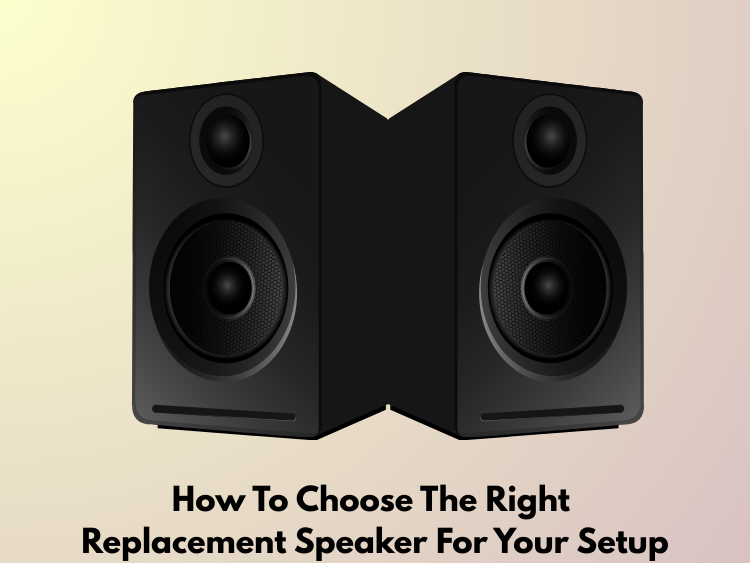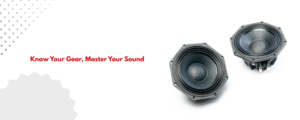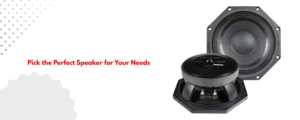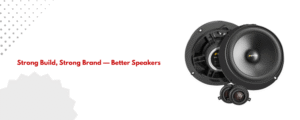Speakers are an important part of any music system. Picking the right new speaker is important for getting the best sound, whether you’re updating your home theater, fixing your car audio, or keeping up with a PA system. Because there are so many choices, it can be hard to find the right one. This easy-to-follow list will help you decide what to do.
Understand Your Existing Setup
You need to know what kind of speaker you already have before you go out and buy a new one. Check out your current speaker’s specs. These are usually written on the back of the component or in the user guide. Some important factors are:
- Impedance (Ohms): How many ohms do most speakers in your home or car have? It is important to match the voltage so as not to damage your speaker or lower the sound quality.
- Power Handling (Watts): Look at the RMS (constant) and peak power values. To make sure it works, your new speaker should be able to handle the same amount or a little more.
- Size and Mounting Depth: Find out how big and deep your old speaker is. Replacements must fit into the room that is already there without any changes.
If you know these simple things, you can be sure your new speaker will work with your amplifier and in your setting.
Define Your Sound Goals
There are different kinds of speakers. Some put more emphasis on bass, some on clear middle sounds, and some on high-end sparkle. Figure out what you want to get better at.
- To get deeper bass, look for speakers with a cone width that is bigger and a strong low-frequency response.
- If you want clear vocals and instruments, you should use midrange drivers or full-range speakers with smooth frequency responses.
- For clear highs, tweeters or speakers with a wide range of high frequencies work best.
- A 2-way or 3-way speaker that splits the sound between multiple drivers for better clarity might be a good choice if you’re putting together a full system.
If you’re considering a home audio upgrade, you might want to check the best replacement speakers for home audio in 2025.
Pick the Right Kind of Speaker
Different kinds of new speakers may be needed depending on the job:
- Home speakers: When shopping for home speakers, pay attention to the sharpness, image, and frequency response. If you have the room, you might want to look into desk speakers, floor-standing types, or speakers that go in the wall.
- Car audio speakers: Depending on how much you want to change things, you can choose between coaxial (full-range) or component speakers.
- PA and DJ speakers: For PA and DJ speakers, make sure they are tough, have a high power, and work efficiently. You should look for speakers that can handle a lot of power without getting distorted.
Because each type of speaker is made for a specific purpose, choosing the right one will make you happier in the long run. You can explore more options by browsing through the best raw replacement speakers in 2025.
Make Sure the Speaker Works with Your Amp
It’s important that the speaker and compressor work well together.
You should get a speaker that can handle between 75 and 100 watts RMS at 8 ohms if your amplifier puts out 100 watts per channel at 8 ohms. If your speakers don’t match, you might get distortion, bad sound, or even damage to your equipment.
If you’re not sure, it’s usually better to pick a speaker with a slightly higher rating than one with a lower rating.
Look at the Build Quality and the Reputation of the Brand
How long a speaker lasts depends a lot on how it was made. Things to look for are:
- Rubber edges (last longer than foam)
- Baskets that are strong (metal frames last longer)
- Good cone materials, such as plastic or paper that has been treated
Stick to names you know you can trust that are known for quality and stability. They may save you money at first, but cheap speakers that don’t have a name often break down quickly and sound bad.
Have a Look at the Future
If you want to add to your sound system later, pick speakers that are easy to connect to subwoofers, amps, or extra drivers. Having a setup that is ready for the future means you won’t have to update as often.
Conclusion
It doesn’t have to be hard to find the right new speaker. First, figure out what your present setting is. Then, list your sound goals, make sure they meet the technical requirements, and keep quality in mind. Your tools will last longer, sound better, and be more fun to listen to if you take the time to choose carefully.




